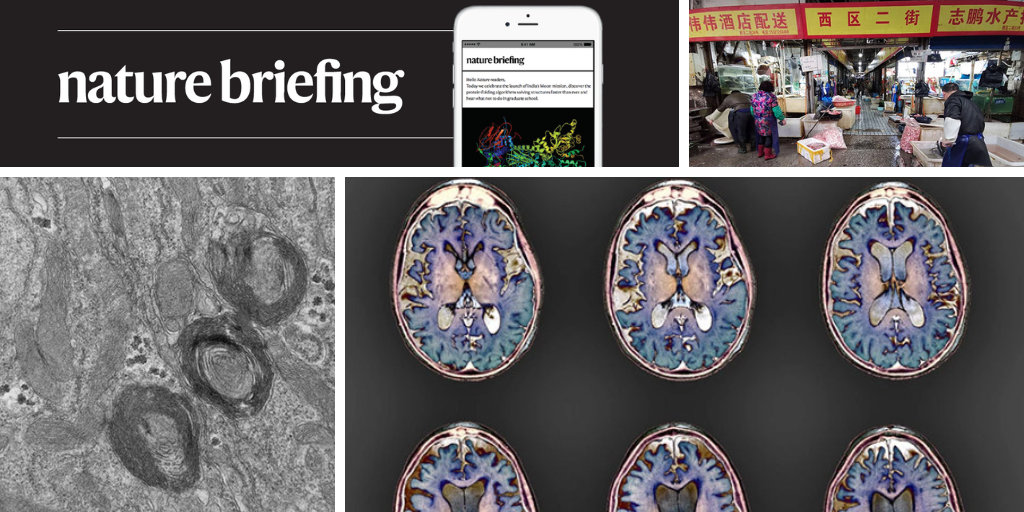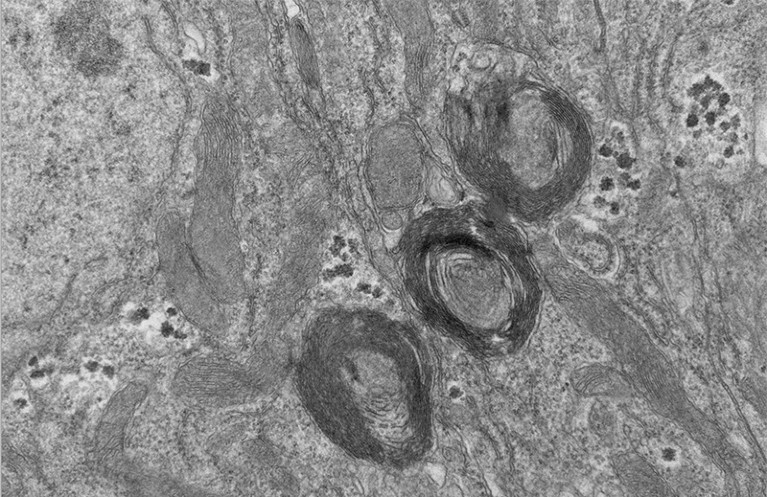Hello Nature readers, would you like to get this Briefing in your inbox free every day? Sign up here.
Three of the newly discovered organelles in a fruit-fly intestinal cell. The organelles seem to be a reservoir of phosphate, a molecule essential to life.Chiwei Xu et al./Nature
Biology textbooks look set for an update: researchers have just discovered a new kind of organelle, a tiny organ-like structure inside cells. Researchers made the discovery while investigating the role of phosphate in cell renewal in the guts of fruit flies (Drosophila melanogaster). The new organelle acts as a reservoir for phosphate, a nutrient that is essential for life. The discovery highlights how much there is to learn about cell physiology, says geneticist and study co-author Chiwei (Charles) Xu. “The beauty is there, it’s just waiting for us to discover it.”
Go deeper with an expert analysis by developmental biologists Emily Strachan and Irene Miguel-Aliaga in the Nature News & Views article (7 min read, Nature paywall)
For the second time, an experimental drug has been shown to reduce the cognitive decline associated with Alzheimer’s disease. On Wednesday, pharmaceutical company Eli Lilly announced in a press release that its monoclonal antibody donanemab slowed mental decline by 35% for some participants in a 1,736-person trial — a rate comparable to competitor drug lecanemab. Researchers warn that, until the full results are published, questions remain as to the drug’s clinical usefulness, as well as whether the modest benefit outweighs the risk of harmful side effects.
Hopes have been dashed that genomic data from swabs collected in the early days of the pandemic will reveal the origins of COVID-19. Data from the swabs, collected by the Chinese Center for Disease Control and Prevention, have been analysed by three teams, but each has failed to pinpoint which animal species — if any — infected people at the market. “I would basically describe this as a negative result,” says Jesse Bloom, the virologist who conducted the latest analysis.
Read more: COVID-origins data from Wuhan market published: what scientists think (7 min read, from 5 April)
Reference: bioRxiv preprint
Features & opinion
During the COVID-19 pandemic, the online platform GISAID emerged as the main repository for viral genome data. It now hosts more than 15 million SARS-CoV-2 genome sequences, more than any other existing database, as well as around 2 million influenza sequences. But several scientists have raised concerns about the platform’s lack of transparency, how it mediates disputes over credit and how it sanctions scientists who have allegedly violated its terms and conditions. Nature spoke with scientists in eight countries about what they see as the future of pathogen-genome sharing, and of GISAID.
In the latest short stories for Nature’s Futures series:
• The joys and frustrations of raising a child arise while teaching a robot companion in ‘Dad and Ick’.
• In the far future, one aspect of our current work life has survived in ‘Rynnden has invited you to a scheduled meeting’
This week, features editor Kerri Smith and senior reporter Heidi Ledford join the Nature Podcast to discuss two stories that look at aspects of women’s health. The first drug that treats hot flushes without hormones represents a shift in thinking: menopause is driven by the brain, not just the ovaries. And many diseases that affect more women than men are underfunded; boosting investment in research into those conditions could reap big rewards.
Nature Podcast | 27 min listen
Subscribe to the Nature Podcast on Apple Podcasts, Google Podcasts or Spotify.
Leif Penguinson needs the finest climbing skills to hide from us so effectively each week, sometimes even hanging upside down in the effort to elude our eyes. Today, Leif is practicing on (or near) the rugged slopes of a rockclimber favourite, Crystal Crag in the Sierra Nevada mountain range in California. Can you find the penguin?
Monday is a holiday in the United Kingdom so the answer will be in Tuesday’s e-mail, all thanks to Briefing photo editor and penguin wrangler Tom Houghton.
This newsletter is always evolving — tell us what you think! Please send your feedback to [email protected].
Flora Graham, senior editor, Nature Briefing
With contributions by Sara Phillips
We’ve recently launched two new e-mails you might like. They’re free, and of course you can unsubscribe at any time.
• Nature Briefing: Cancer — a new weekly newsletter written with cancer researchers in mind. Sign up here to receive the next one.
• Nature Briefing: Translational Research covers biotechnology, drug discovery and pharma. Sign up here to get it free in your inbox each week.







More News
AI & robotics briefing: AI decodes languages in first ‘bilingual’ brain-reading device
Mexico’s next president is likely to be this scientist — but researchers are split in their support
Pro-CRISPR PcrIIC1-associated Cas9 system for enhanced bacterial immunity – Nature